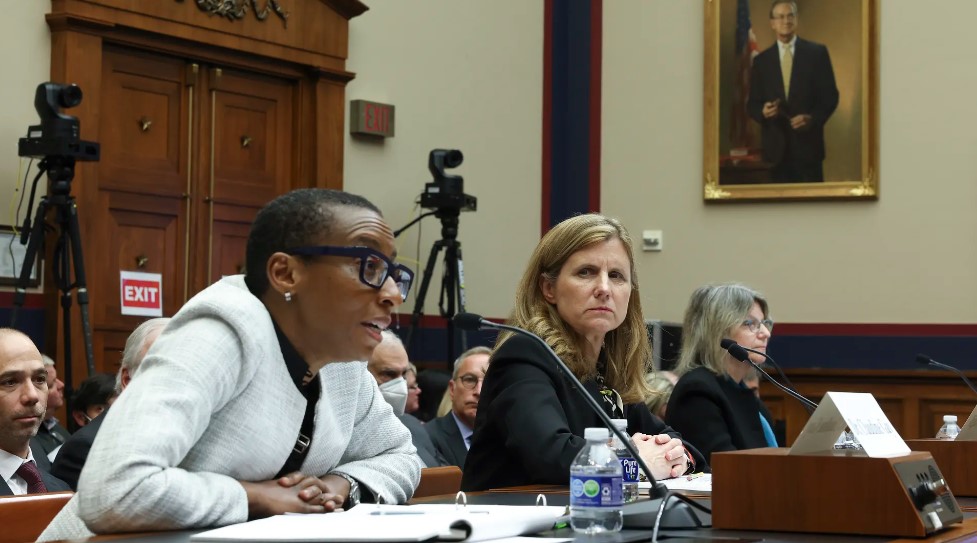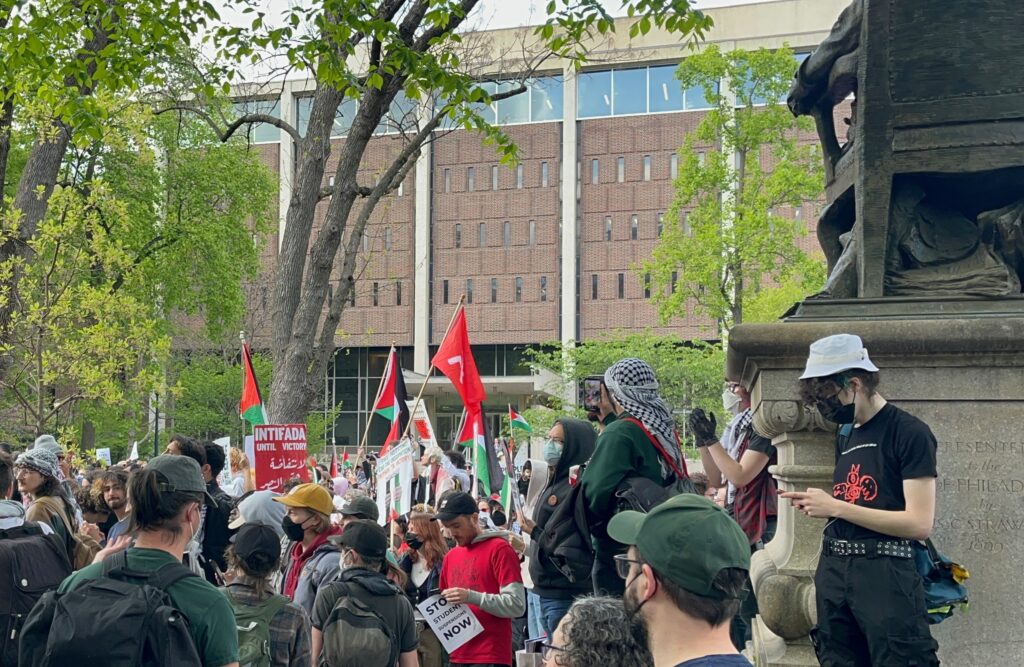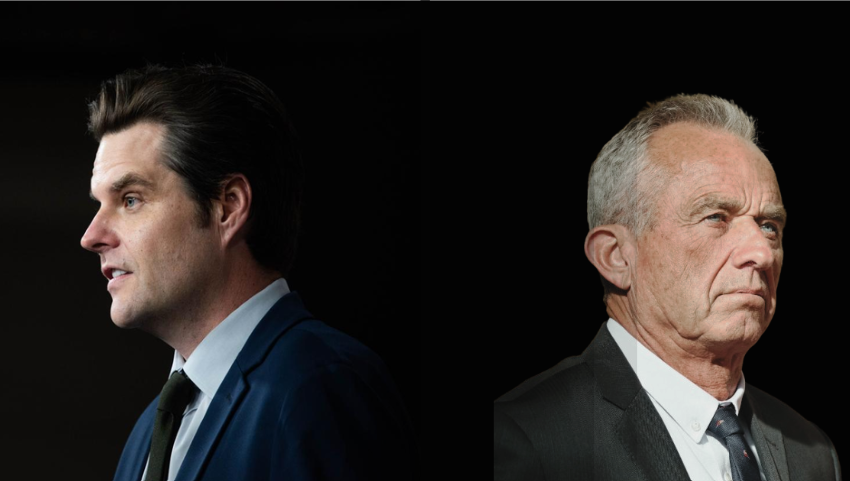Franchetti’s Facts | One year after Oct 7, the Jewish people have done what they always have, survived and built a better future.

Penn students holding a vigil for the lives lost in the October 7th terrorist attacks on October 20th, 2023. / Photo credit: Abraham Franchetti
By Abraham Franchetti
On October 7th, 2023, the Jewish people were caught by surprise. The Israeli military and intelligence services underestimated the will and capability of Hamas. The consequences were devastating: one of Israel’s worst defeats and the deadliest day for Jews since the Holocaust. More than 1,200 civilians were murdered, 40 of which were Americans. 246 civilians were taken hostage, 101 of which are still being held more than a year later, including 7 Americans.
As a Jewish American, I watched these events unfold with despair and heartbreak. The Jewish diaspora is more connected today than any other point in our history, and many Jewish Americans, including myself, have Israeli friends or family. In this time, I found reassurance in my faith and my hope. My faith was derived from the strength of the Jewish religion, which has persevered for centuries against the world’s most severe persecutions. I had hope because I knew that I could take action to help the people of Israel. I expected the following months to include donation drives and messages of solidarity and support.
In hindsight, I should’ve known better than to expect to be free from antisemitism and discrimination at home. Only weeks earlier, Penn hosted the Palestine Writes literature festival, which brought antisemitism and radicalism to our campus before it was in vogue. Only one day after the attack, before the bodies had been counted, student groups at Harvard chose to blame Israel. In the months that have followed, at campuses across America, radical Students for Justice in Palestine (SJP) chapters have moved the needle from blaming Israel to praising terrorists and calling for destroying Israel and America. Rather than simply contributing to the fight against terror abroad, Jewish students across America have been at the forefront of combating some of the worst antisemitism and anti-Americanism in our country’s history.
Shortly after Israel began fighting Hamas in Gaza, I remember feeling my blood boil as I tried to focus on school work while protestors praised terrorists outside. Only weeks after the attack, a Penn student, Tara Tarawaneh described the October 7th Massacre as “glorious”, adding “I remember feeling so empowered and happy, so confident that victory was near” while leading a protest. Protests on our campus included the slogans “From the River to the Sea, Palestine will be free” and “Intifada, Revolution, there is only One Solution”, which have their roots in the Hamas Covenant’s promise to exterminate the Jewish people. At Penn and across the country, Jewish students and their allies were caught by surprise by the ferocious support for terrorism and antisemitism on our campuses.
We turned to our institutions and university leaders to protect us, ensure equal treatment, and return the educational environment to normal. Instead, elite universities that for years lectured and disciplined students and faculty over the slightest “microaggressions” against other minorities defended enabling anti-Semitism in the name of free speech, invoking a clear double standard.

When our universities failed us, Jewish students and their allies turned to the American people and Congress. We were surprised when Liz Magill testified that calling for the genocide of Jews did not constitute a violation of Penn’s policies—which include a ban on harassment and discrimination based on religion and ethnic origin. However, America’s institutions and people stepped up, with Congressional leaders on both sides of the aisle demanding Magill step down. Congressional oversight put university leaders across the country on notice that they would be held accountable for their actions.
The actions of Congress were, however, not enough to counter the ferocity of antisemitism. Last spring, at more than 100 colleges across America, outside agitators and anti-Israel students erected encampments on our campuses. Protestors at UCLA physically blocked Jewish students from entering Powell Library and vandalized Royce Hall. Vanderbilt protestors graffitied and barricaded themselves inside Kirkland Hall. At Columba students and agitators seized a campus building and held blue collar custodians hostage inside.
Trespassers at Penn took over campus space, stole school property, harassed Jewish students, forced the closure of libraries during finals, and smuggled weapons onto our campus. Unlike Columbia, where University leadership initially prevented the NYPD from taking action, Philadelphia Mayor Cherelle Parker resisted allowing Philadelphia Police to respond to ongoing crimes on Penn’s campus.
Nevertheless, Jewish students persevered, ensuring the country understood the discrimination we faced and that the American people knew those responsible. After more than a week, the mayor relented, and many of these criminals were arrested.

With our universities failing us, Jewish students have taken initiative to achieve justice and fight antisemitism. By protesting, writing, and testifying, we have ensured that protestors and universities cannot discriminate against Jews with impunity. A judge recently ruled against UCLA for violating federal law in enabling discrimination against Jewish students. The perpetrator of hate speech and threats against Jewish students at Cornell has been convicted and sentenced to 2 years in prison, while a Students for Justice in Palestine (SJP) leader may be deported for his crimes. Penn students have testified to the State Senate and Congress and carefully documented instances of antisemitism to support an ongoing lawsuit. Although the last year has been disappointing and scary at times, looking back we can see that America’s institutions have begun functioning to protect Jews. Congress and the justice system take time to make changes, but their impacts are being felt.
The past year of activism by Jewish students and their allies has helped establish resources to fight antisemitism, bring national attention to support for terror on our campuses, and ensure universities are on notice that they must treat us fairly. As a result, PAO’s most recent unregistered rally was removed for violating campus policies, before they could seriously disrupt class or harass students. SJP and other Hamas supporters denigrate themselves further by using October 7th to hold events in support of terrorism, and universities are taking action against these threats. While support for terror has not faded on our campuses, Jewish students are better organized, more resilient, and more prepared to fight for our freedoms than we were one year ago.
Importantly, Jewish students have not been alone in defending our campuses. At UNC, fraternity brothers re-raised American flags that were taken down by pro-Palestine protestors. At LSU, patriotic students counter-protested and reminded Hamas supporters that terrorists have zero SEC championships. The Transport Workers Union, which represents Columbia’s custodians, is suing the university for putting their workers in danger. At the University of Texas at Austin, competent leadership prevented protestors from seizing parts of campus. Already, colleges who allowed students to interrupt the educational environment are suffering market based consequences, with Emerson’s leadership blaming protests for falling enrollment.
It is true that in our cities and on our campuses, terrorist sympathizers have disrupted American life to harm Jews and praise murderers who have vowed to destroy America. But it is also true that these radicals represent one of the greatest policy failures in modern protest history. Students for Justice in Palestine has achieved none of their goals and made no changes in American foreign policy. America and Israel remain staunch allies. The 119th Congress will begin with at least two more Jewish allies than the 118th did, after the defeat of two anti-Israel representatives. Across the country, patriotic Americans have come together to defend our country and our values from sympathizers of terrorism.
At the same time, Israel’s campaign to defeat terrorist threats is succeeding. Hamas’ military capabilities have been decimated, and Hezbollah’s leadership has been decapitated. Israel has avenged 241 U.S. service members murdered in the 1983 Lebanon Barracks bombing by killing its mastermind, Faud Shukr. The remarkable success against Hezbollah has restored faith in Israel’s ability to defend herself and crippled the Islamic Republic of Iran.
For the Jewish people, this past year, like so many before it, has been one of resilience. Although at times it has been frightening, Jewish students have shown remarkable bravery and determination. In the face of illegal discrimination and open support for terrorism, some funded by Iran, Jewish students have stood strong and will continue to do so. Americans—Jewish and non-Jewish alike—were caught by surprise by the wave of antisemitism and anti-Americanism that has swept our country. One year after this war began, the Jewish people and their allies are stronger than ever in their resolute defense of Israel and America, and we’re not going anywhere.
Abraham Franchetti is a junior in Wharton studying Finance with a minor in Classical Studies from Port Washington, NY. Abraham is also the Business Director for The Pennsylvania Post. His email is bramf@wharton.upenn.edu.



